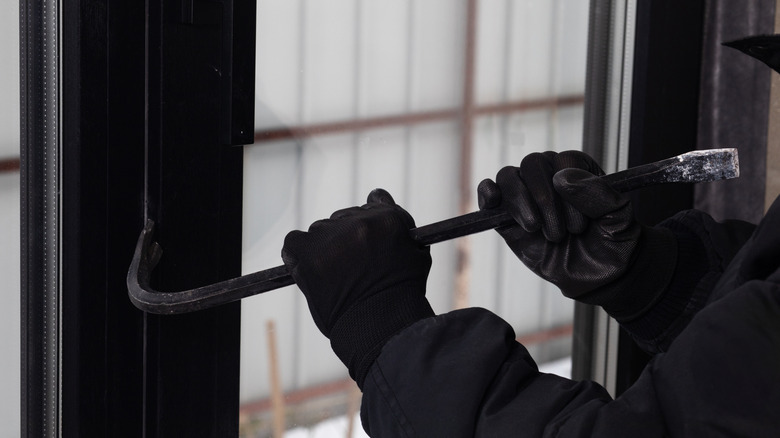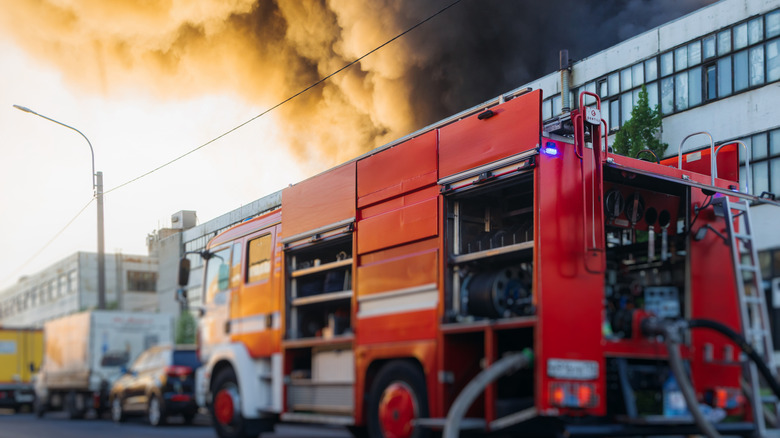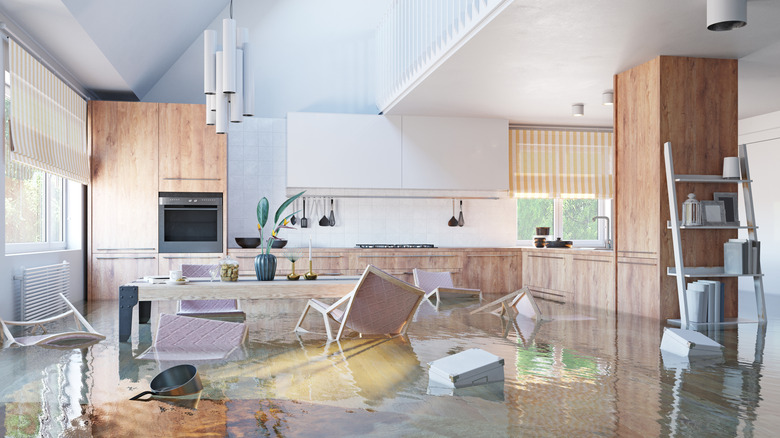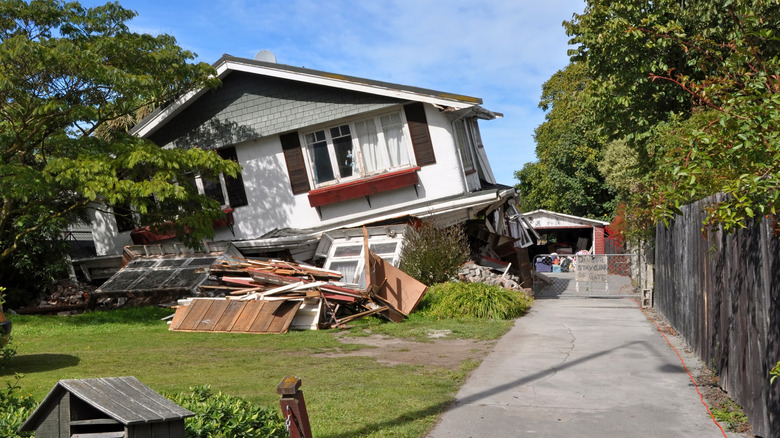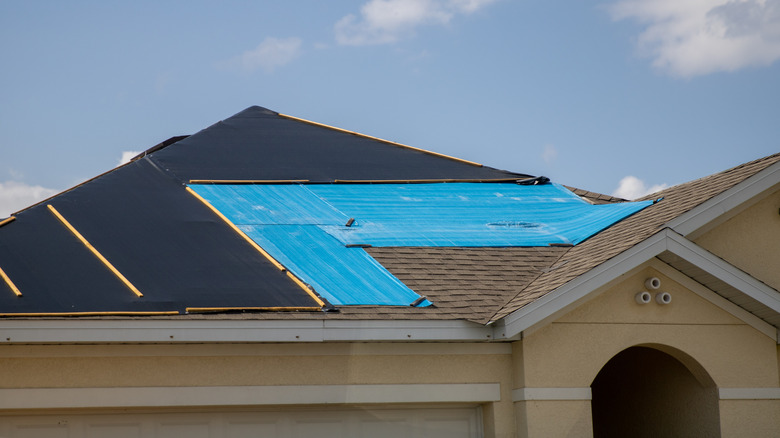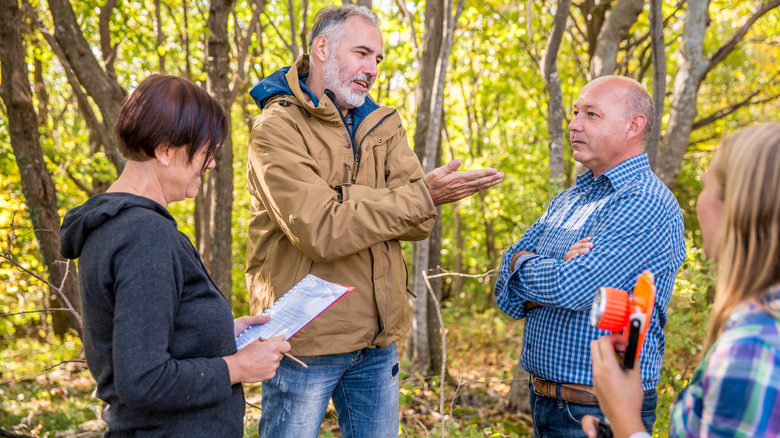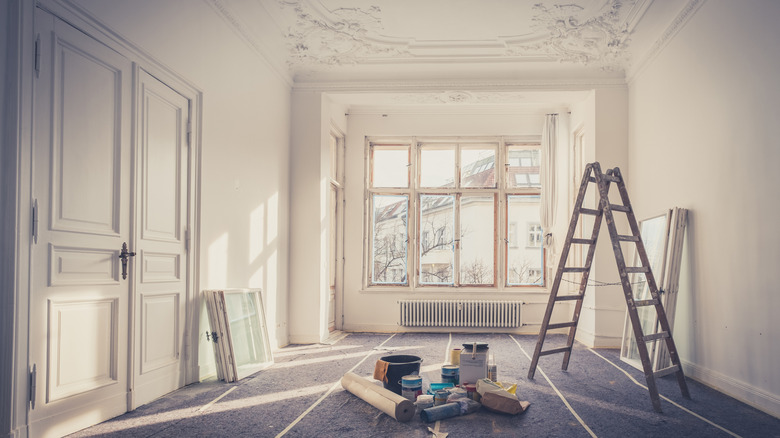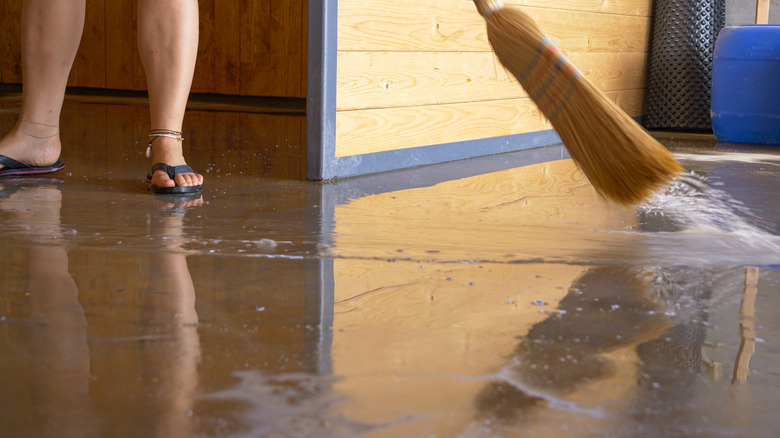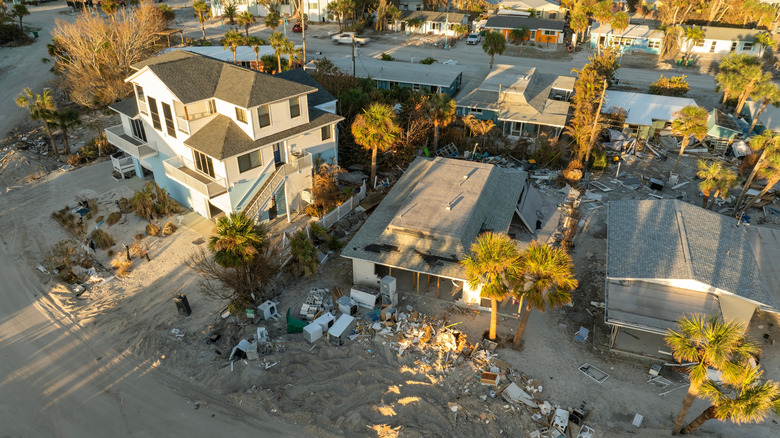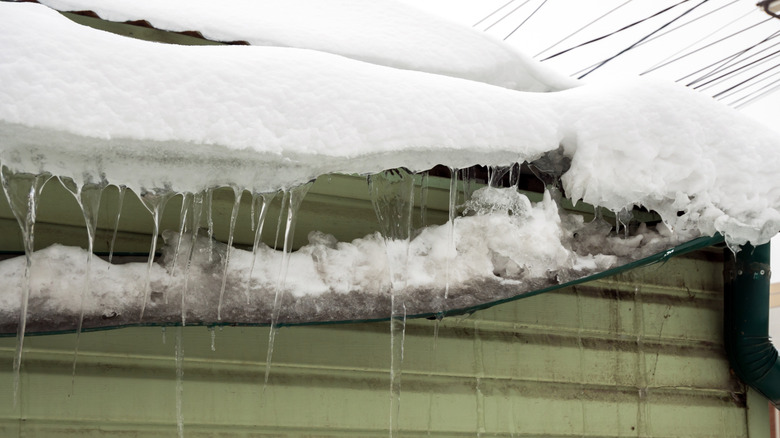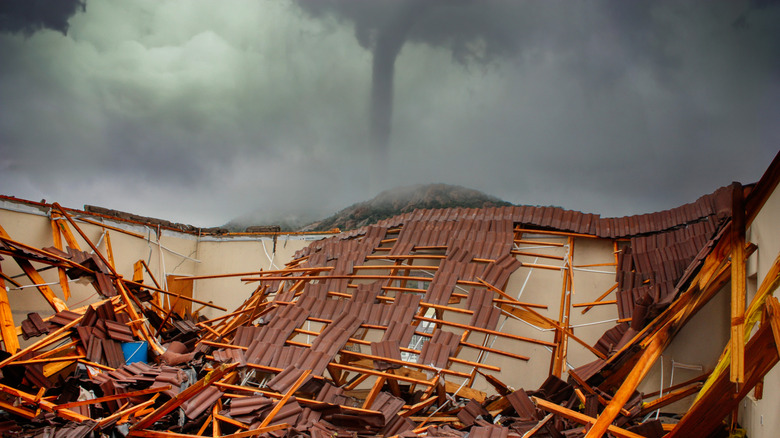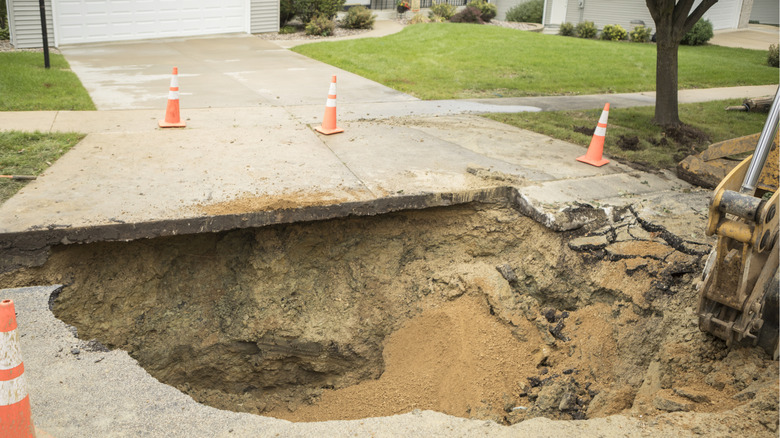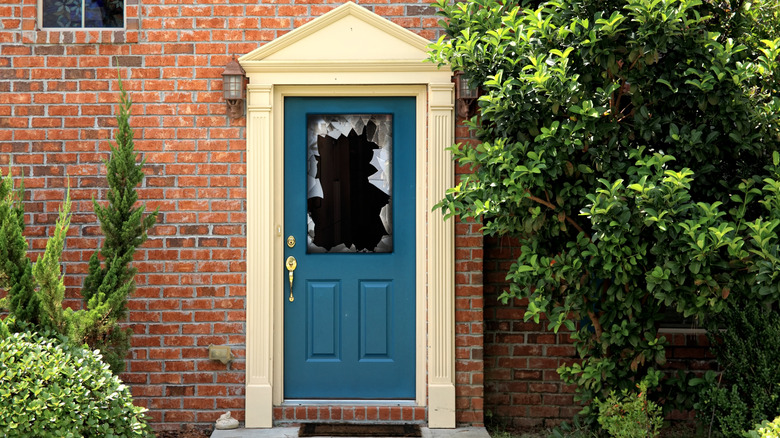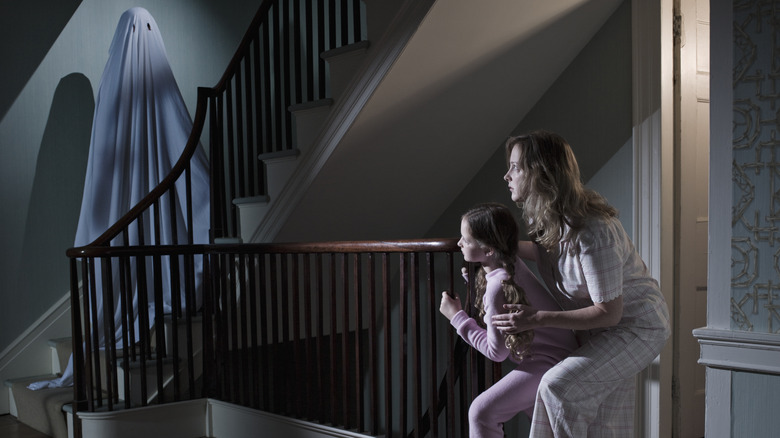16 Types Of Insurance Homeowners May Need And Why
As famed surrealist writer Franz Kafka was once believed to say: "Better to have, and not need, than to need, and not have." And while insurance can feel like a logistical nuisance for homeowners, its purpose is to protect you from unforeseen circumstances due to a number of emergencies. Ranging from flood and water backup insurance to Spooksafe insurance (yes, that does cover you in case of paranormal activity in your house ... more on that later), the list of possible coverage opportunities, policies, and additional riders may feel a bit overwhelming. However, smartly assessing the needs for your home, depending on location, the type of house you own, and a number of other factors, can help narrow down your needs.
While some of these instances are often covered by basic homeowners' insurance policies — like personal liability insurance and even aircraft in peril insurance – there are a few extra policies you may want to look into if your house is in an area prone to the factors that create those insurance needs. Whether you're looking to make sure that some vital pieces are represented in your basic coverage or you're curious what extra precautions you can take when it comes to your home, this list offers a variety of policies to consider. You may not need said Spooksafe insurance, but storm insurance, earthquake insurance, or water backup insurance could be things you might opt for.
Personal liability insurance
One of the foundational insurances that all homeowners should have in their tool kit, personal liability insurance covers bodily injury sustained by a guest in your home. Whether that's an accidental slip and fall on your outdoor deck or an unfortunate trip down the stairs, personal liability should cover the costs of medical care and ensure that you don't have to pay out of pocket. Some policies also cover pain and suffering, potential lost wages, or even death benefits. Typically, this is a part of your homeowner's insurance policy, but coverages vary, so diligently check what yours entails.
Dwelling and personal property insurance
These protections are also often included in traditional homeowner's insurance policies, but additional coverage exists as well. While dwelling protections offer basic coverage on the structure of your home and other buildings on the property, personal property protection covers lost personal belongings inside the home. Thus, in the event of a theft, fire, flood, or other major life situations where your belongings can get damaged or lost, your personal items can be compensated for. Taking out additional coverage for these two things is a good idea, particularly for high-value items.
Fire insurance
Fire insurance is another form of property insurance, but it is considered a more specialized service. Like you'd expect, fire insurance is meant to protect you against losses in a fire, whether that be property damage or loss of belongings. However, not all fire insurance policies are created equal. Often, there are caveats to loss from fire, such as exclusions based on whether the fire was deliberately caused or even in high-risk places where fires are common. Be sure to regularly check your fire insurance policy, if you have one, to make sure you're getting coverage to your expectations.
Flood insurance
Another insurance you'll likely never want to use but will be glad to have in the event of a catastrophe, flood insurance should cover property loss, both structural and personal. Your policy — and its price — will largely be affected by your location, the construction of your house, its age and materials, and the type of house it is. Remember, some structures and built environments are often not covered by flood insurance, such as landscaping and certain types of buildings, but it may cover other unexpected damage from floods, like mold.
Earthquake insurance
Earthquake insurance is another form of specialized service, and as you'd imagine, it covers property damage in the event of an earthquake — a cost that often will not be covered by traditional policies. Like with floods, the cost of earthquake insurance will vary based on location, how your home is built, and the level of coverage selected. It's a common home insurance mistake to assume your basic policy covers the aforementioned catastrophic events, but without additional policies, you may be caught off guard and on the hook for losses to your home during tragedies.
Replacement plus cost
All the above scenarios can lead to catastrophic losses, and even with specialized insurance, you may not get enough to rebuild due to depreciation values. For example, if you lost your car in a flood, the replacement value would be the current price of the car, not what you paid when you bought it. Replacement plus cost policies are meant to add that additional coverage and allow you to get the accurate replacement costs. It also has the added benefit of protecting homeowners who have owned their property for a long time and are worried about property value depreciation.
Title insurance
One would think this day in age, land disputes are a thing of the past, but in reality, there are still squabbles over where someone's fence can go or whether or not that berm is owned by the neighbor. Title insurance covers homeowners from losses resulting from disputes over ownership of property. It's not just those fence arguments either; title insurance also protects against hidden liens surfacing on your home from previous disputes. So long as the home is still owned by you or your heirs, title insurance keeps that title safe.
Ordinance or law insurance
When you suffer a big property loss, the last thing you're thinking about is all those grandfathered codes you likely didn't have to deal with when you moved in. But if rebuilding or repairing a structure after damage triggers an ordinance or law, you may find yourself on the hook for a higher fee than you expected to replace or repair things to bring it up to code. However, with ordinance or law coverage, it protects a certain amount of cost that comes with addressing said ordinance or law.
Water back up and sewer coverage
While flood insurance covers a natural disaster, water backup and sewer coverage protect you from costs associated with sump pump failure or plumbing backups. While it's common for this added coverage to include loss of property/personal belongings, some policies will even include loss of use — meaning you'll get reimbursed for any living expenses you incur while staying in alternate accommodations during repair. Be sure to check your coverage for that added benefit, as having your hotel or temporary housing covered is a huge weight lifted off your shoulders during an otherwise stressful time.
Coastal insurance
Coastal coverage specifically targets those who may have particular issues living near the coastlines. On some occasions, other insurances like flood insurance won't cover damage to the degree and specificity as coastal insurance, including damage from hurricanes, tropical storms, storm surges, and excessive flooding. Wind damage is also routinely covered with coastal insurance as an added precaution. Rising sea levels and environmental changes constantly put coastal homeowners on edge, so coastal insurance helps address these niche concerns head-on.
Aircraft peril coverage
Another policy that is sometimes found in basic homeowners insurance policies, aircraft peril covers homeowners from loss in case of a failed aircraft or other object falling from an aircraft. In theory, it covers dwellings and personal belongings, but will not be triggered if the aircraft was intentionally crashed. This policy is specific to aircraft, their parts, or things associated with the plane, like luggage, not just any object that happens to fall out of the sky, however. If you live under a flight path, including general aviation, check your policy to make sure this is covered.
Weight of snow, ice, or sleet insurance
Though aircraft peril is a 'named peril' that's specifically outlined in some basic homeowner insurance policies, 'open perils' aren't often covered unless you have specialized insurance, like those aforementioned environmental insurances. Surprisingly, events like snow, ice, and sleet damage are considered open perils. However, damage to structures like pools, patios, driveways, fences, and awnings is usually not covered without additional weight of snow, ice, or sleet policies. This should be a no-brainer added policy in areas that experience harsh winters, where multiple feet of snow are commonplace.
Windstorm and hail insurance
Windstorm and hail insurance covers damage to your home's structure and contents from severe weather like hurricanes, tornadoes, and hailstorms. And while this sounds like a great catch-all for the aforementioned disasters, where you may need yet another policy in addition to this one, is in cases where the storm is named. 'Named storm' insurance applies a special, usually higher, percentage deductible for damage caused by a tropical storm, hurricane, or other weather event officially named by an entity like the National Weather Service. These storms and associated damages are not covered by basic homeowners' insurance.
Sinkhole insurance
Though not a usual part of regular homeowner insurance policies, sinkholes can be covered with an additional policy or rider. While sinkholes — a rare phenomenon where the dissolving of rock, roadway, or otherwise solid material by water collapses the ground — are uncommon in most areas in the country, they can be common in some states, including Alabama, Florida, Kentucky, and Texas. Sinkhole coverage would offer payment to rebuild or repair your home in the event of such an unexpected disaster, as well as stabilize the land underneath your home and foundation.
Vandalism and malicious mischief insurance
If you own property that's not always occupied, like a vacation rental, then consider taking out an additional policy for vandalism and malicious mischief. There are usually some basic coverages under homeowners insurance policies that protect against vandalism, but often it doesn't cover damage to dwellings that are vacant for periods of time, like rentals. These additional fail-safes aim to cover intentional destruction and/or injury conducted by individuals, regardless of whether it is your permanent residence, another dwelling on your property, or a rental unit.
Spooksafe insurance
If you thought we've covered the most niche kinds of homeowners' insurance, you haven't seen anything yet. Spooksafe insurance, a service provided by a now unoperational insurance company in the U.K., offers coverage against paranormal activity for up to $1 million. It covers injury and death as well as property damage and attacks caused by ghosts, ghouls, vampires, and werewolves. It sounds silly, but a family did receive a payout in the U.S. when a woman was thrown to her death mysteriously. Other functional companies still offer similar specialty insurance if you're interested.


